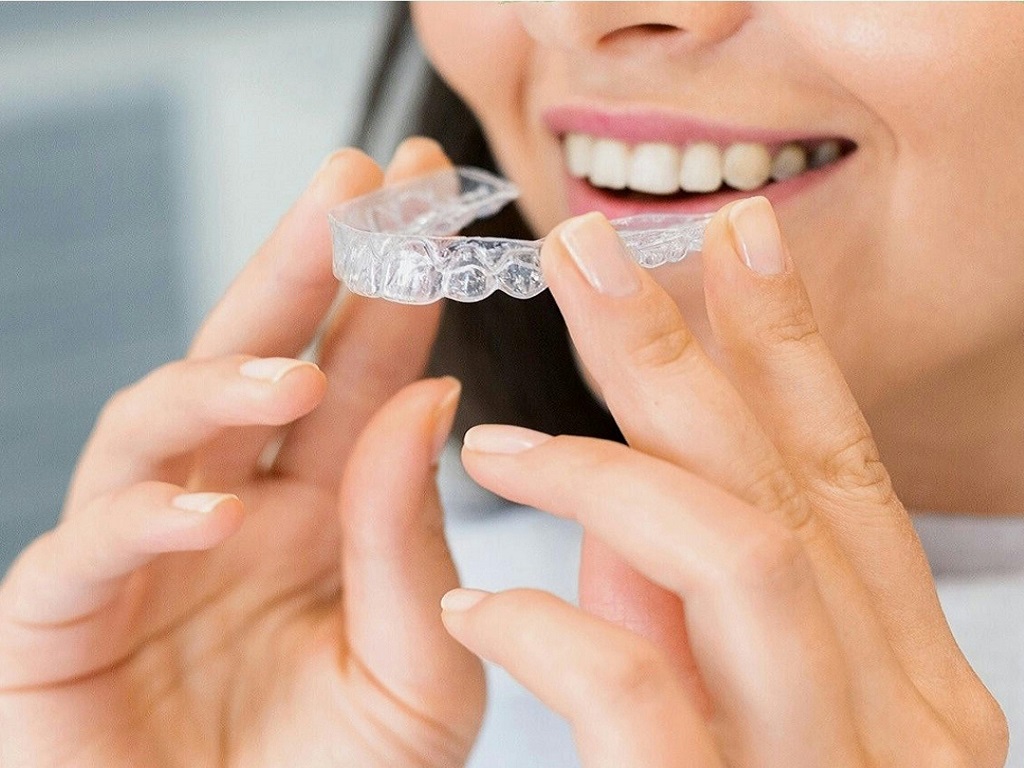Tooth enamel is the hard outer layer of the tooth. Beneath the enamel is dentin, composed of collagen, minerals, water, and proteins. If the enamel wears away, it exposes the dentin and reduces the lifespan of the tooth, according to the health website VeryWell Health (USA).
To prolong the lifespan of your teeth, you can apply the following methods:
Avoid biting with unnecessary force.
Minimize the use of teeth for biting, opening packaging, or holding objects. People who grind their teeth while sleeping should use a night guard to prevent their upper and lower teeth from rubbing against each other.
If a tooth has previously had a large filling or has cavities affecting the pulp, you should discuss with your dentist about changing the filling material, using a crown, or other ways to protect the tooth from cracking or breaking.
Protect tooth enamel

People who grind their teeth while sleeping can use a mouthguard to prevent tooth wear.
To reduce enamel and dentin erosion, dentists recommend choosing toothbrushes with soft bristles and appropriate toothpaste. In fact, some whitening toothpastes can cause abrasion to the tooth surface.
Another extremely important thing is to reduce exposure to acidic agents that can damage tooth enamel, such as avoiding eating too much oranges, lemons, tangerines, or grapefruit. Diseases such as Gastroesophageal reflux needs treatment because acid traveling from the stomach up into the mouth, if it comes into frequent contact with teeth, can erode tooth enamel.
Maintain a healthy saliva production.
Saliva protects teeth by diluting acidic substances in the mouth, has antibacterial properties, and reduces tooth decay. Saliva is also crucial for chewing, swallowing, and speaking.
To ensure sufficient saliva production in the mouth, it's important to drink enough water. Certain medications for depression and high blood pressure can also reduce saliva production. If you experience this effect, you should discuss it with your doctor to adjust your medication if necessary.
Reduce the effects of aging.
Cellular aging is the process of changes in DNA within cells. This results in a reduced ability to resist physical, chemical, and biological damage. Cellular aging can promote the formation of new cancer cells or trigger chronic diseases such as Alzheimer's, diabetes, osteoporosis, or heart disease.
Teeth are also affected by aging. To limit the damaging effects of aging on cells, we need to make some lifestyle changes such as avoiding smoking, eating a healthy diet, exercising, and treating oral health problems like cavities and gum disease early, according to VeryWell Health.
Source link


![[Photo] Prime Minister Pham Minh Chinh receives the Governor of Tochigi Province (Japan)](/_next/image?url=https%3A%2F%2Fvphoto.vietnam.vn%2Fthumb%2F1200x675%2Fvietnam%2Fresource%2FIMAGE%2F2025%2F12%2F16%2F1765892133176_dsc-8082-6425-jpg.webp&w=3840&q=75)
![[Image] Leaked images ahead of the 2025 Community Action Awards gala.](/_next/image?url=https%3A%2F%2Fvphoto.vietnam.vn%2Fthumb%2F1200x675%2Fvietnam%2Fresource%2FIMAGE%2F2025%2F12%2F16%2F1765882828720_ndo_br_thiet-ke-chua-co-ten-45-png.webp&w=3840&q=75)
![[Photo] Prime Minister Pham Minh Chinh receives Lao Minister of Education and Sports Thongsalith Mangnormek](/_next/image?url=https%3A%2F%2Fvphoto.vietnam.vn%2Fthumb%2F1200x675%2Fvietnam%2Fresource%2FIMAGE%2F2025%2F12%2F16%2F1765876834721_dsc-7519-jpg.webp&w=3840&q=75)
![[Live] 2025 Community Action Awards Gala](/_next/image?url=https%3A%2F%2Fvphoto.vietnam.vn%2Fthumb%2F1200x675%2Fvietnam%2Fresource%2FIMAGE%2F2025%2F12%2F16%2F1765899631650_ndo_tr_z7334013144784-9f9fe10a6d63584c85aff40f2957c250-jpg.webp&w=3840&q=75)



































































![[Photo] Prime Minister Pham Minh Chinh attends the Vietnam Economic Forum 2025](https://vphoto.vietnam.vn/thumb/402x226/vietnam/resource/IMAGE/2025/12/16/1765893035503_ndo_br_dsc-8043-jpg.webp)


































Comment (0)